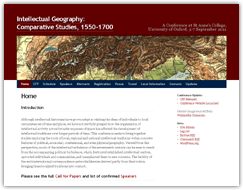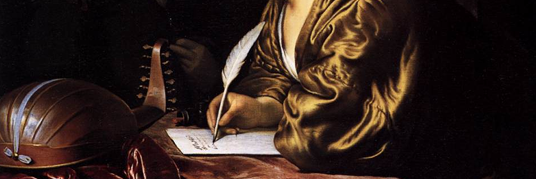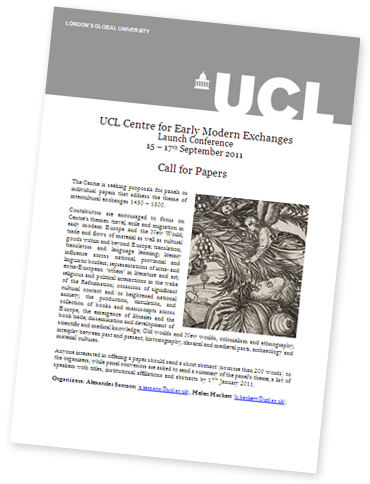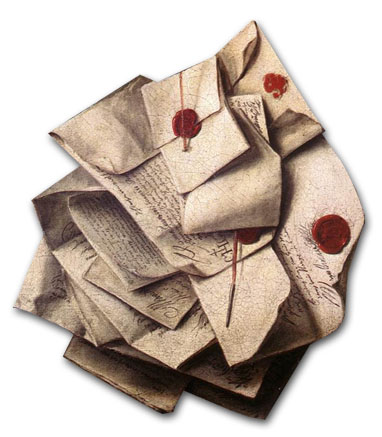You are viewing the Cultures of Knowledge Blog archive for the ‘Calls for Papers’ Category:
 The CFP for the next Project conference, Intellectual Geography: Comparative Studies, 1550-1700, to be held at St Anne’s College, University of Oxford from 5-7 September 2011, has now been released. Confirmed keynote speakers include Professor Miles Ogborn (Queen Mary, University of London) and Professor Thomas DaCosta Kaufmann (Princeton University). The conference will explore prospects for an analytical geography of the concrete spatial features both underpinning national and international networks of learned correspondence and nurturing the intellectual traditions exchanged through those networks. It will examine the material conditions structuring epistolary communication, the geographical features conditioning local, regional, and national intellectual traditions, and the ideas generated when international networks brought these localized traditions into contact. At the centre of the conference will be a comparison of how the radically different physical, political, and confessional geographies of England and the Holy Roman Empire structured intellectual activity in manners radically different and hitherto unappreciated, and how the wars and reformations of the seventeenth century cross-fertilized these traditions in highly significant ways. The deadline for abstracts is 1 April 2011. For the full CFP, please visit the conference microsite.
The CFP for the next Project conference, Intellectual Geography: Comparative Studies, 1550-1700, to be held at St Anne’s College, University of Oxford from 5-7 September 2011, has now been released. Confirmed keynote speakers include Professor Miles Ogborn (Queen Mary, University of London) and Professor Thomas DaCosta Kaufmann (Princeton University). The conference will explore prospects for an analytical geography of the concrete spatial features both underpinning national and international networks of learned correspondence and nurturing the intellectual traditions exchanged through those networks. It will examine the material conditions structuring epistolary communication, the geographical features conditioning local, regional, and national intellectual traditions, and the ideas generated when international networks brought these localized traditions into contact. At the centre of the conference will be a comparison of how the radically different physical, political, and confessional geographies of England and the Holy Roman Empire structured intellectual activity in manners radically different and hitherto unappreciated, and how the wars and reformations of the seventeenth century cross-fertilized these traditions in highly significant ways. The deadline for abstracts is 1 April 2011. For the full CFP, please visit the conference microsite.
Kim McLean-Fiander
November 12, 2010
Calls for Papers, Conferences and Workshops, Events, Project Updates
Tags: Censorship, Commerce, Communication, Exchange, Networks, Propaganda, Seventeenth Century

A Woman Writing a Letter (1680) by Frans van Mieris
The University of Reading Early Modern Studies Conference will take place 18–20 July 2011. Organised by the Early Modern Research Centre, the conference takes as its theme Communication and Exchange and will feature both a panel on Cultures of Knowledge and a plenary session by the Project Director Professor Howard Hotson. The conference hopes to generate new thinking and debate on such questions as: what forms did communication and information take (oral, printed, numerical, or even visual), how did its forms change, and how was it circulated; what did people know about the world outside their own immediate spheres in the early modern period; what new techniques for the calculation and expression of information appeared; how far was information managed by government through propaganda and censorship or the maintenance of secrecy; did changing practices of communication stimulate the emergence of new genres; how did the stock of knowledge of the world increase through the endeavours of seamen, merchants, factors and adventurers as well as scientists and travel writers; and what part did patronage and the commerce in books and manuscripts play? The deadline for paper and panel proposals is 31 January 2011. Further details are available in the full call for papers (pdf).
Updated to include confirmed speakers and link to full CFP

Papers are invited for a conference on ‘The Global Dimensions of European Knowledge, 1450-1700’, which will take place at Birkbeck, University of London on 24-5 June 2011. The conference will investigate the impact of European exploration and travel on the structures, contents and sources of authority of European knowledge c.1450-1700, seeking to explore connections between the making of knowledge and a broad range of intellectual, political, cultural, religious and mercantile encounters between Europe and the wider world. It aims to bring together scholars from different disciplines working on any aspect of European knowledge that included an extra-European dimension. Forms of knowledge under consideration include ethnology, natural history, botany, natural philosophy, geography, cartography, medicine and chronology. Confirmed speakers include Professor Felipe Fernández-Armesto (Notre Dame), Professor Pamela Smith (Columbia), Dr Joan-Pau Rubiés (London School of Economics), Professor Ricardo Padrón (Virginia), Professor Nicolás Wey-Gómez (Brown), Dr Michiel van Groesen (Amsterdam), and Professor Peter Burke (Cambridge). The deadline for proposals is 31 July 2010; for further details and submission instructions, see the full call for papers.
 Contributions are sought for the launch conference of the recently established UCL Centre for Early Modern Exchanges, which will take place at UCL on 15–17 September 2011. Proposals for individual panels or papers should address aspects of intercultural exchanges 1450–1800, and ‘contributors are encouraged to focus on Centre’s themes: travel, exile and migration in early modern Europe and the New World; trade and flows of material as well as cultural goods within and beyond Europe; translation, translators and language learning; literary influence across national, provincial and linguistic borders; representations of intra- and extra-European ‘others’ in literature and art; religious and political interactions in the wake of the Reformation; occasions of significant cultural contact and/or heightened national anxiety; the production, circulation, and collection of books and manuscripts across Europe, the emergence of libraries and the book trade; dissemination and development of scientific and medical knowledge; Old worlds and New worlds, colonialism and ethnography; interplay between past and present, historiography, classical and medieval pasts, archaeology and material cultures’. The deadline for proposals is 17 January 2011; for full details, please see the conference webpage.
Contributions are sought for the launch conference of the recently established UCL Centre for Early Modern Exchanges, which will take place at UCL on 15–17 September 2011. Proposals for individual panels or papers should address aspects of intercultural exchanges 1450–1800, and ‘contributors are encouraged to focus on Centre’s themes: travel, exile and migration in early modern Europe and the New World; trade and flows of material as well as cultural goods within and beyond Europe; translation, translators and language learning; literary influence across national, provincial and linguistic borders; representations of intra- and extra-European ‘others’ in literature and art; religious and political interactions in the wake of the Reformation; occasions of significant cultural contact and/or heightened national anxiety; the production, circulation, and collection of books and manuscripts across Europe, the emergence of libraries and the book trade; dissemination and development of scientific and medical knowledge; Old worlds and New worlds, colonialism and ethnography; interplay between past and present, historiography, classical and medieval pasts, archaeology and material cultures’. The deadline for proposals is 17 January 2011; for full details, please see the conference webpage.
 Papers are sought for a major conference on ‘Cultures of Correspondence in Early Modern Britain, 1550-1640’, which will take place at the University of Plymouth on 14-16 April 2011. According to the organizers, the conference aims to ‘enhance our understanding of epistolary culture and to challenge accepted models of epistolarity through the study of letter-writing practices in all their nuanced complexity, ranging from the textual production of letters, their subsequent delivery and circulation, to the various ways in which letters were read and preserved for posterity’. Abstracts should focus on one the following key themes:
Papers are sought for a major conference on ‘Cultures of Correspondence in Early Modern Britain, 1550-1640’, which will take place at the University of Plymouth on 14-16 April 2011. According to the organizers, the conference aims to ‘enhance our understanding of epistolary culture and to challenge accepted models of epistolarity through the study of letter-writing practices in all their nuanced complexity, ranging from the textual production of letters, their subsequent delivery and circulation, to the various ways in which letters were read and preserved for posterity’. Abstracts should focus on one the following key themes:
- The materiality of the letter: the physicality of correspondence (paper, ink, seals, folding) as well as the social context of epistolarity (composition, delivery, reading, archiving);
- Correspondence networks, the circulation of letters, postal systems, and modes of delivery;
- Letters, news, and intelligence;
- Authenticity, deception, and surveillance: forgeries, secrecy, ciphers, and codes;
- Women’s letters and the gendered nature of letter-writing;
- Epistolary literacies, social hierarchies, and the acquisition and diffusion of letter-writing skills;
- Manuscript letters and letters in print;
- The letter as a cultural genre and the rhetorics of letter-writing;
- Humanistic letter-writing practices and the familiar letter; letter-writing manuals and models; education, pedagogy and learning to write letters;
- Categories or types of letters: suitors’ letters, letters of petition, love letters, letters of condolence;
- Genres of printed letters: prefatory letters, dedicatory letters, address to the readers;
- Staging the letter: letters and letter-writing in drama;
- Editing and the digitization of correspondence.
Proposals of 300 words (including titles) should be sent to James Daybell (james.daybell(at)plymouth.ac.uk) and Andrew Gordon (a.gordon(at)abdn.ac.uk) by 1 July 2010. For further details, please see the full call.
 Papers are sought for an interdisciplinary graduate conference on ‘Intellectual Exchange and Networks in Europe, 1500-1660: Approaches from the Humanities and Social Sciences’, due to take place at the University of Chicago on 7-8 May 2010. Featuring keynote contributions from Denis Crouzet and Peter N. Miller, the conference will explore how ideas moved through Europe between 1500 and 1660, with a particular emphasis on social networks, trade routes, epistolary webs, and multiple forms of literary transmission. The conference will also consider the movement of ideas in the present. The deadline for the receipt of 250-word abstracts is 30 November 2009; for further details and submission instructions, see H-Net.
Papers are sought for an interdisciplinary graduate conference on ‘Intellectual Exchange and Networks in Europe, 1500-1660: Approaches from the Humanities and Social Sciences’, due to take place at the University of Chicago on 7-8 May 2010. Featuring keynote contributions from Denis Crouzet and Peter N. Miller, the conference will explore how ideas moved through Europe between 1500 and 1660, with a particular emphasis on social networks, trade routes, epistolary webs, and multiple forms of literary transmission. The conference will also consider the movement of ideas in the present. The deadline for the receipt of 250-word abstracts is 30 November 2009; for further details and submission instructions, see H-Net.
 The CFP for the next Project conference, Intellectual Geography: Comparative Studies, 1550-1700, to be held at St Anne’s College, University of Oxford from 5-7 September 2011, has now been released. Confirmed keynote speakers include Professor Miles Ogborn (Queen Mary, University of London) and Professor Thomas DaCosta Kaufmann (Princeton University). The conference will explore prospects for an analytical geography of the concrete spatial features both underpinning national and international networks of learned correspondence and nurturing the intellectual traditions exchanged through those networks. It will examine the material conditions structuring epistolary communication, the geographical features conditioning local, regional, and national intellectual traditions, and the ideas generated when international networks brought these localized traditions into contact. At the centre of the conference will be a comparison of how the radically different physical, political, and confessional geographies of England and the Holy Roman Empire structured intellectual activity in manners radically different and hitherto unappreciated, and how the wars and reformations of the seventeenth century cross-fertilized these traditions in highly significant ways. The deadline for abstracts is 1 April 2011. For the full CFP, please visit the conference microsite.
The CFP for the next Project conference, Intellectual Geography: Comparative Studies, 1550-1700, to be held at St Anne’s College, University of Oxford from 5-7 September 2011, has now been released. Confirmed keynote speakers include Professor Miles Ogborn (Queen Mary, University of London) and Professor Thomas DaCosta Kaufmann (Princeton University). The conference will explore prospects for an analytical geography of the concrete spatial features both underpinning national and international networks of learned correspondence and nurturing the intellectual traditions exchanged through those networks. It will examine the material conditions structuring epistolary communication, the geographical features conditioning local, regional, and national intellectual traditions, and the ideas generated when international networks brought these localized traditions into contact. At the centre of the conference will be a comparison of how the radically different physical, political, and confessional geographies of England and the Holy Roman Empire structured intellectual activity in manners radically different and hitherto unappreciated, and how the wars and reformations of the seventeenth century cross-fertilized these traditions in highly significant ways. The deadline for abstracts is 1 April 2011. For the full CFP, please visit the conference microsite.



 Papers are sought for a major conference on ‘Cultures of Correspondence in Early Modern Britain, 1550-1640’, which will take place at the
Papers are sought for a major conference on ‘Cultures of Correspondence in Early Modern Britain, 1550-1640’, which will take place at the  Papers are sought for an interdisciplinary graduate conference on ‘Intellectual Exchange and Networks in Europe, 1500-1660: Approaches from the Humanities and Social Sciences’, due to take place at the
Papers are sought for an interdisciplinary graduate conference on ‘Intellectual Exchange and Networks in Europe, 1500-1660: Approaches from the Humanities and Social Sciences’, due to take place at the 
 Join
Join 